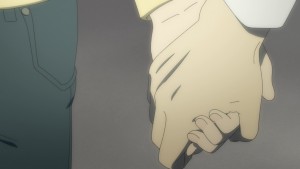 Time skips in anime are always a nervous subject, and with good reason. I can think of may shows that jumped the shark pretty hard as a result, but with The Great Passage I think it stands as pretty likely that things will be different. First of all there’s the nature of the story itself (“Dictionaries can’t be written in a day”). And then there’s the large store of confidence the very experienced anime staff has built up with their work through the first seven episodes. And finally, this series is based on a very well-respected source material, which was obviously able to pull this off. So normal anime disclaimers probably don’t apply here, since Fune wo Amu is anything but a normal anime.
Time skips in anime are always a nervous subject, and with good reason. I can think of may shows that jumped the shark pretty hard as a result, but with The Great Passage I think it stands as pretty likely that things will be different. First of all there’s the nature of the story itself (“Dictionaries can’t be written in a day”). And then there’s the large store of confidence the very experienced anime staff has built up with their work through the first seven episodes. And finally, this series is based on a very well-respected source material, which was obviously able to pull this off. So normal anime disclaimers probably don’t apply here, since Fune wo Amu is anything but a normal anime.
 For all that, I confess I didn’t see it coming. A good deal of time has clearly passed – “13 years” is the figure tossed around, though whether that’s since the actual start of work on “The Great Passage” or since we last left the narrative I’m not sure. Our first clue that something is up comes when Sasaki introduces Majime as “Chief“, and soon it’s clear a lot of water has flowed under the bridge. Tora-san is still around but Obaa-san, it seems, is not. Majime and Kaguya are now married, and Araki has – as promised – gone down to part-time. In fact, Majime is the only full-time employee left in the dictionary editing department.
For all that, I confess I didn’t see it coming. A good deal of time has clearly passed – “13 years” is the figure tossed around, though whether that’s since the actual start of work on “The Great Passage” or since we last left the narrative I’m not sure. Our first clue that something is up comes when Sasaki introduces Majime as “Chief“, and soon it’s clear a lot of water has flowed under the bridge. Tora-san is still around but Obaa-san, it seems, is not. Majime and Kaguya are now married, and Araki has – as promised – gone down to part-time. In fact, Majime is the only full-time employee left in the dictionary editing department.
 There’s a strong sense of melancholy to all this – this is such a Quixotic project, so unloved and forgotten. Yet there’s a certain hopefulness to it too, a sense of the plucky optimism of this underdog undertaking. We see it through the eyes of Kishibe Midori (Hikasa Youko, “Bungaku Shoujo” herself), the new employee the publisher has finally seen fit to throw at the department. She’s a refugee from one of the company’s fashion magazines, “Northern Black“, where she apparently clashed repeatedly with her co-workers and editor over her obsession with “the importance of words”. If you think that sounds like a good fit, you’re definitely right.
There’s a strong sense of melancholy to all this – this is such a Quixotic project, so unloved and forgotten. Yet there’s a certain hopefulness to it too, a sense of the plucky optimism of this underdog undertaking. We see it through the eyes of Kishibe Midori (Hikasa Youko, “Bungaku Shoujo” herself), the new employee the publisher has finally seen fit to throw at the department. She’s a refugee from one of the company’s fashion magazines, “Northern Black“, where she apparently clashed repeatedly with her co-workers and editor over her obsession with “the importance of words”. If you think that sounds like a good fit, you’re definitely right.
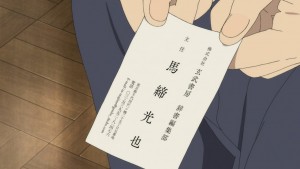 The scenes where Kishibe suffers through her first days in this strange exile are mighty uncomfortable to watch. Majime’s people skills haven’t improved much, and Kishibe really has no idea why she’s here. All she can do is organize and agonize, waiting for direction from Majime that never comes. But with a welcome dinner at Kaguya’s restaurant (her suggestion) Kishibe meets the rest of the team, and things begin to turn for the better. Nishioka clearly still considers himself a part of it, and as usual he complements Majime’s weaknesses splendidly. He gives the tipsy the “how would you define “right”?” test, and she passes with flying colors.
The scenes where Kishibe suffers through her first days in this strange exile are mighty uncomfortable to watch. Majime’s people skills haven’t improved much, and Kishibe really has no idea why she’s here. All she can do is organize and agonize, waiting for direction from Majime that never comes. But with a welcome dinner at Kaguya’s restaurant (her suggestion) Kishibe meets the rest of the team, and things begin to turn for the better. Nishioka clearly still considers himself a part of it, and as usual he complements Majime’s weaknesses splendidly. He gives the tipsy the “how would you define “right”?” test, and she passes with flying colors.
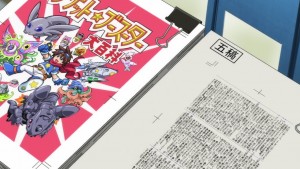 There’s a lot I’d certainly like to know – for example, what’s happened between Nishioka and Remi? But as usual, The Great Passage stubbornly dances to its own beat, waxing eloquent on the subject of the stickiness of dictionary paper and the meaning of “out-of-placeness”. For all that this series is about the characters and their quiet passion for what they do, ultimately the titular dictionary is the central focus, and while we’re told “The Great Passage” is in its third proofreading, it’s clear this is a race against the clock. Matsumoto-san is quite old now and fighting a stubborn “cold” (even when the source material is a novel, you have to take notice when an anime goes there), and the “team” continues to be sidetracked by inconsequential but time-eating side projects (like editing character encyclopedias for video games).
There’s a lot I’d certainly like to know – for example, what’s happened between Nishioka and Remi? But as usual, The Great Passage stubbornly dances to its own beat, waxing eloquent on the subject of the stickiness of dictionary paper and the meaning of “out-of-placeness”. For all that this series is about the characters and their quiet passion for what they do, ultimately the titular dictionary is the central focus, and while we’re told “The Great Passage” is in its third proofreading, it’s clear this is a race against the clock. Matsumoto-san is quite old now and fighting a stubborn “cold” (even when the source material is a novel, you have to take notice when an anime goes there), and the “team” continues to be sidetracked by inconsequential but time-eating side projects (like editing character encyclopedias for video games).
 As much as we as an audience would like to see the team finish “The Great Passage” for their sake, in the end creating it is something that they’re doing not for themselves, but for posterity. Fune wo Amu is a series about passion, and the true test of whether or not one is passionate about something is whether they want to do it not for their own gratification, but for the rightness of the thing itself. And clearly for Majime and the rest of the department (including Kishibe, it seems), building that ship that will allow others to share their thoughts and feelings is the work of their lifetimes, and will long outlast them.
As much as we as an audience would like to see the team finish “The Great Passage” for their sake, in the end creating it is something that they’re doing not for themselves, but for posterity. Fune wo Amu is a series about passion, and the true test of whether or not one is passionate about something is whether they want to do it not for their own gratification, but for the rightness of the thing itself. And clearly for Majime and the rest of the department (including Kishibe, it seems), building that ship that will allow others to share their thoughts and feelings is the work of their lifetimes, and will long outlast them.




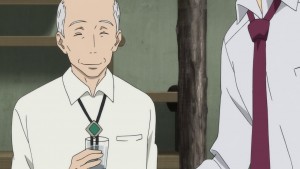
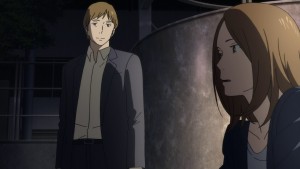
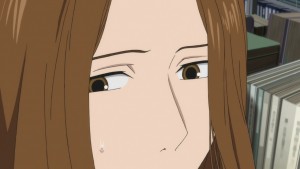
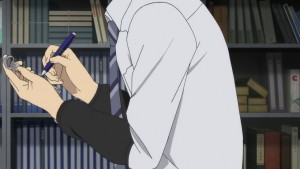

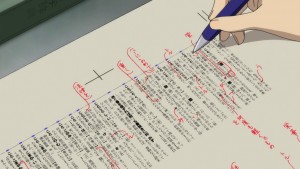
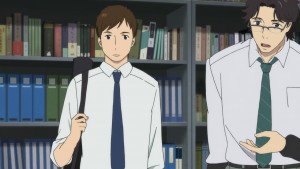
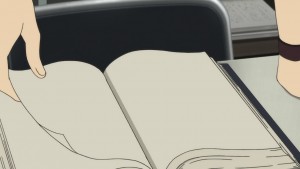

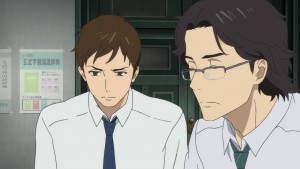

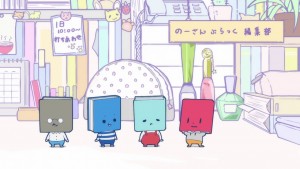
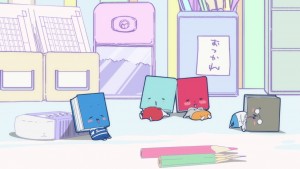
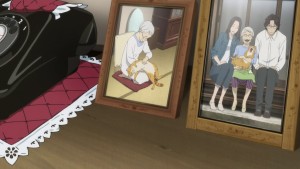
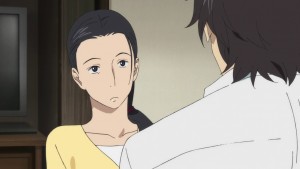
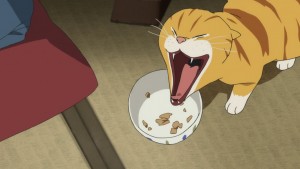
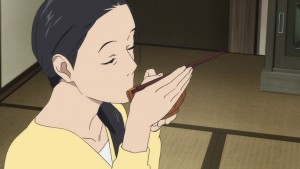
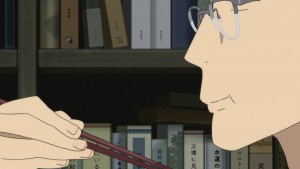

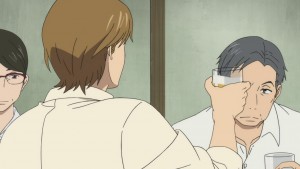
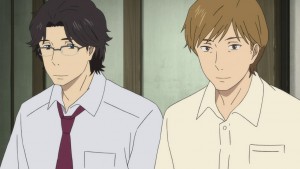
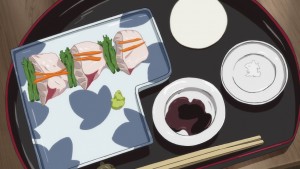
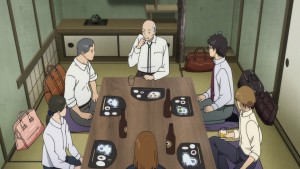
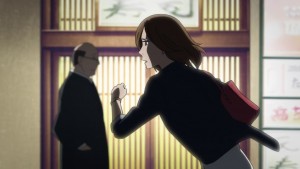
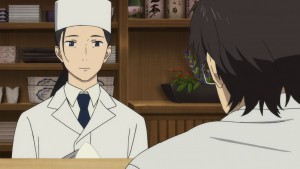
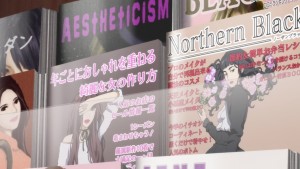


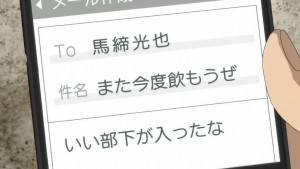
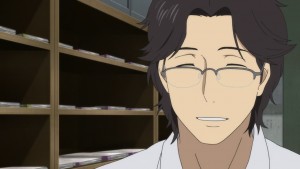

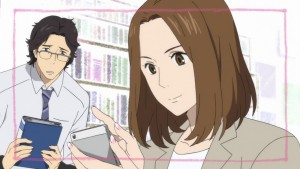


GiGi
December 2, 2016 at 7:12 amI am not sure if that is the original Tora-san though. My heart skipped a beat when Majime asked his wife on how to read “young woman’s mind”. Only Majime could ask such an innocent question and was lucky enough to have a life partner who would kindly remind him of her fragile heart. I love that moment the most of all. Have a great weekend! Thank you for your review as always
Guardian Enzo
December 2, 2016 at 8:07 amOy, that didn’t even occur to me.
elianthos
December 2, 2016 at 9:49 am@GiGi: oh my D: you might be right about Tora-san. Both in those photographs and in previous episodes his stripes pattern looks different (esp. on the forehead) than that on the living feline we see this week.
Zilla
December 4, 2016 at 12:03 pmI think it is a different cat. The original was only ever called Tora, but she calls this one Torako, doesn’t she?
xraymind
December 4, 2016 at 10:31 pmThe new cat has white fur on the paws. The old cat has orange fur on the paws.
leongsh
December 2, 2016 at 7:48 amI love the discussion about the paper sample for the dictionary. When Majime mentioned that the paper sample did not have the stickiness, I fully understood what he meant before he explained it. I would love to be sitting in at that paper company’s technical discussion about that paper and its lack of stickiness problem.
elianthos
December 2, 2016 at 10:03 amPaper quality geekery love! Here In Italy the centuries-old paper making tradition is waning but if you are an artist or publisher it’s still a pretty serious business. And indeed the tactile features vary depending on context and final use… :).
– Glad to see Nishioka is still sticking (eh) around and I am quite curious about Remi too. The lack of hints and/or wedding bands is of little use here… Majime and Kaguya [the latter now a sushi chef owning her own restaurant. Congrats!] are married and apparently ringless as well.
– Professor’s got a ‘cold’ and barely touched his food ): . Please stick around Gramps!
Yukie
December 3, 2016 at 4:02 am@elianthos: Majime is actually wearing a wedding ring (there was a shot of his hand when he was working at his desk). As for Kaguya, I didn’t really pay attention, but I’m guessing a ring would get in the way of her work?
I was shell-shocked by the time-skip that the entire episode felt like a few seconds.
elianthos
December 4, 2016 at 11:29 am@Yukie: yeah, that’s right. About Kaguya’s scenes she might have removed the ring for work, her off work scene angles instead just didn’t really show that part of her left hand enough to tell. I went back parsing the scenes today just focusing on their hands and indeed you can see Majime’s ring during the office sequence. Then you see his ring again (but they forgot to colour it) for about one second during the introduction party at Kaguya’s… and then they forgot to draw it altogether for the rest of the episode including the preview ^_^”.
The silver lining to a QC/continuity slip like this is that maybe this applies to Tora-san’s stripes too. #longliveneko
Guardian Enzo
December 4, 2016 at 11:34 amI can’t imagine a professional chef would feel comfortable wearing their wedding ring while they’re working.
Karmafan
December 2, 2016 at 6:03 pmWatching anime (and especially this series) makes me wonder how Japanese people show love, find a mate, and get married. Everything is so formal, no one kisses or holds hands. Parents don’t hug their kids or kiss them.I’m sure they love their kids or their mate but it all seems so dry and passionless. Many of us were wondering how he was gonna snag this beautiful woman and where would that lead and yet a time warp took that away from us.
Guardian Enzo
December 2, 2016 at 10:23 pmYou do realize that real life is sometimes very different than anime, right?
Karmafan
December 3, 2016 at 6:06 amSo you are saying its just in anime that Japanese people do not hug their kids, kiss or hold hands in public?
Guardian Enzo
December 3, 2016 at 9:02 amYes, and I can speak from first-hand observation. Maybe Japanese are as a rule less demonstrative in their affections than most Westerners, but it’s by no means a monolithic thing.
Zilla
December 3, 2016 at 6:13 amI was pretty amazed by how blunt Majime was about the paper not being right. Maybe that was partially to show that he is still socially awkward, or perhaps the Japanese people I have had work dealings with are just more passive-aggressive, but I would have expected something more like “Hmmmmmm, the stickiness, hmmmm. Muzukashi.” at which point you are left to guess exactly what part of the stickiness is wrong.
Guardian Enzo
December 3, 2016 at 9:02 amIt’s all about passion – everything in this show is about passion. It’s something Majime is passionate about.
Earthling Zing
December 5, 2016 at 8:21 amI found that the time skip breathed in quite a bit of new life, things were starting to get predictable and stagnant.